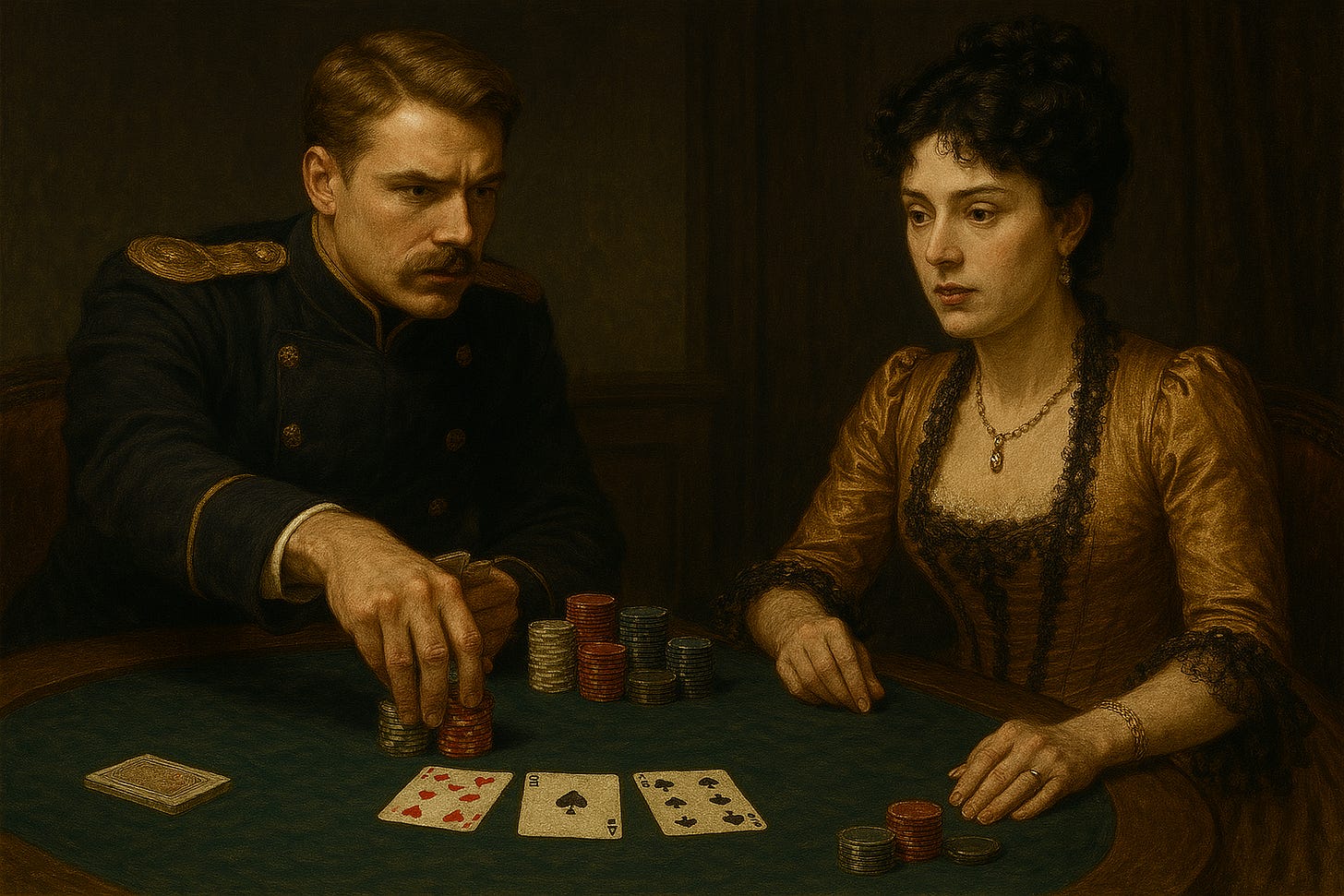Why Losing Feels Worse than Winning Feels Good
Or, how the GOAT of all Tolstoy quotes explains why we love our bad beat stories
One quote that frequently comes back to me is the opening line of Tolstoy’s Anna Karenina: “All happy families are alike; each unhappy family is unhappy in its own way.” The novel’s plot follows the story of a few unhappy families in particular, tracing the specific way the cracks in the family tree split.
I think of this quote often at work, where I work on large, long-spanning projects for big companies. The smooth projects feel largely the same, but when they go poorly, they rarely do so for the same reason(s) twice. There’s only so many ways to run a successful business; there’s a million and one ways to run it into the ground (HBO’s Succession comes to mind). The same is true in the milieu of daily life: it only takes one ingredient missed to ruin a dish, it only takes just that one extra feature to turn a dream sweater into one you wouldn’t be caught dead wearing, it only takes one mistake from a distracted driver to total your new car.
This quote has taken broader form as the Anna Karenina principle, or, the idea that Jared Diamond explains in his book, Guns, Germs, and Steel, more succinctly than I am able to rephrase: “We tend to seek easy, single-factor explanations of success. For most important things, though, success actually requires avoiding many separate possible causes of failure.”
The same is true in poker. There’s only one way to win: amass chips and trade them in for cash. But for this to happen, a million things need to go right. There’s myriad ways to lose: getting it in while behind, value-owning yourself, getting rivered, villain going runner-runner, folding what would have been the winning hand. When every win requires evading the many loss conditions, it seems that every loss shakes out as such in a slightly different way.
This also helps explain the question of why a loss feels so much more crushing than a win feels uplifting.

Take poker tournaments, for example. The only way to truly win is to collect all of the chips in play. To do so, you need to skirt busting each time you’re at risk. Even when the odds are stacked in your favor, there’s a million and one ways for things to go wrong. I’ve lost a pre-flop all-in to 69o— 30% equity still wins 30 percent of the time. To win a poker tournament, things need to go right again and again and again. You need to play well, and take the correct risks; but those risks need to pay off. Say you have AA against 2♥️3♠️. When you get it in while ahead and hold, that feels deserved. You skirted the roughly 10% chance of something going wrong. But when you get it in while ahead and lose, now that stings. 2♥️3♠️ flopped trips; 2♥️3♠️ went runner-runner straight; 2♥️3♠️ flopped two pair. For how infrequent it is to lose in this spot, there’s just so many ways to.
So why do we love telling our bad beat stories? Because each sequence of events feels unique, novel, and compelling. It takes one sentence to describe a win— “In for 500, out for 2.5k”— but the story of how things went wrong takes more explanation. Naturally, no one is shocked to hold when they shove aces pre. But when aces lose against weaker holdings, those holdings find their outs in the quirkiest of ways. There are 52! (or 8.0658e67, or a beyond our comprehension level of huge) amounts of ways to shuffle a 52-card deck. When the shuffle doesn’t pan out in our favor, our statistically advantaged favor, that can sting. It is not enough to say that you got rivered, you want the people you are subjecting to listening to your hand histories to know the intimate details of the pre-flop action, post-flop table talk, and the sequence of community cards down to the suits.
And this is not true only for poker. In stories of our losses, we tend to look for the why— what went wrong, where we erred, how the world screwed us over the smallest of mistakes.
One tens-place away from an A is a rounding error in the course of five tests, a midterm, and endless amounts of coursework. But it’s not an A. Five minutes too long in the oven is nothing compared to the hours you spent waiting for the dough to rise. But it’s enough to ruin a loaf of bread. In 2018, John Isner and Kevin Anderson spent over six hours in a tennis match: it only took two extra points for Anderson to win the 2018 Wimbledon singles semi-finals.
In Isner’s words: “I competed hard. That's what it comes down to. That's what I have to be proud of… I just lost to someone who is just a little bit better at the end and I guess he just won a little bit more of the bigger points.”
Losing hurts because when everything was going right, only one thing had to go wrong. An errant card, some time distracted, a missed serve. And what’s even worse is that losing leaves us with nothing to show but rumination on exactly that, what could have been and how close to it we were.
One of the most proven ways to get better at poker is to do just that: take your mistakes apart on the drive home, think deeply about hands you could have played slightly differently, plug the spot into the solver to see just how much EV your play lost you on that street. So tell a bad beat. Tired as the trope may be, at least the content’s always original. Just try to learn something from it.





Anna I loved this!! You’re so talented bby